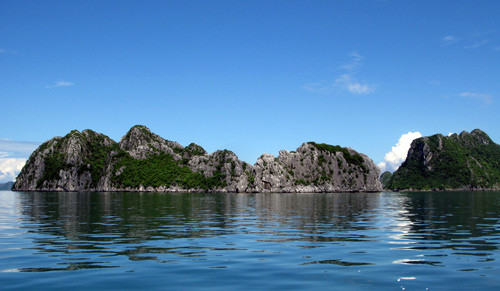Located in Bai Tu Long bay, Ba Mun island is a gem home to diverse species of animals and plants of Bai Tu Long National Park. The island has recently attracted a large number of tourists to experience some wild travel.

Alongside Bai Tu Long, Ba Mun island has become the most diverse and rich biosphere in Vietnam.
Ba Mun Island is about 15km from Van Don district's Ao Tien Tourism Port, with an area of about 1,800ha and a length of more than 20km, running east-west. It is a wildlife animal paradise and is covered by primeval forests which, together with sheer rocks, creating a natural habitat for various kinds of animals.
On the east side of the island, strong waves hit the cliffs to create bubbles and foam tens of metres high. The western side, on the other hand, features tranquil scenery and calm water that ripples around the boat.
Bai Tu Long National Park is a home to about 2,000 species of fauna and flora, including 72 animals and 32 plants listed in Vietnam’s Red Book of endangered species, many of them live on Ba Mun Island.
The most prominent plants are teakwood, sindora and ironwood species. Notably, there are lan hai orchids which a few years ago people thought were extinct. Currently, this kind of orchid is only found in Lao Cai province and Ba Mun Island.
As for animals, Ba Mun has many rare species, including a golden deer population which is quite large. There are also other animals such as chamois and monkeys along with sea birds and migratory birds.

The water is clear and clean due to the cover of the high forest.
On the island, there are seven large astreams with water flowing all year round and the water is clear and clean due to the cover of the high forest. This is a valuable source of freshwater in the middle of the sea.
Since Bai Tu Long National Park was established in 2001, wildlife preservation on the Ba Mun Island has been tightened. A rescue centre was opened in 2010 to take care of its wildlife as well as those rescued from illegal trafficking. The wildlife rescue centre of Ba Mun island is one of the wildlife rescue centres with the highest survival rate in the country. All wild animals that are released by the rescue centre have good health care and restored wild instincts, helping preserve biodiversity in Bai Tu Long National Park.
Bai Tu Long National Park comprises 40 islands, either earth or limestone, scattering across three communes, Ha Long, Van Yen and Minh Chau of Van Dong district. The bay covers a total area of 15,783 hectares, including 6,125 hectares of land, and is home to 1,090 species of fauna and flora. The park is considered a priceless national treasure. In the park, 102 rare and precious species, including 72 species of fauna and 30 varieties of flora listed in Vietnam’s red book of endangered species can be found. The park also has 1,000 hectares of wetlands, which includes mangrove forest, sandy and rocky tidal banks and seaweed that provide food and shelter for animals. The wetlands ecosystem, with its impressive scenery and biodiversity, has attracted many eco-tourism, environmental education and research activities.
The area of coral accounts for only a minor section of the park, but has an important role to play as an aquatic resource. It has high biological productivity and is a gene bank for many types of sea species.
Besides the extremely diverse biological environment, the park also has archeological value, with evidence of ancient Viet people residing here 14,000 years ago. Operational since April, 2002, Bai Tu Long National Park is a stunning tourism spot with a rich ecosystem, therefore it should receive sustainable protection, conservation and development.
By QMG Reporters